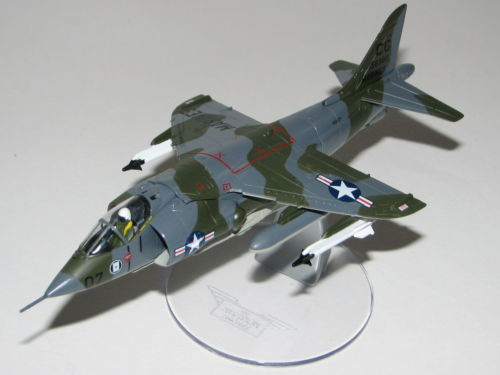BAe AV-8A Harrier – VMA-231 Ace of Spades, US Marine Corps 1973
Excellent model of the AV-8A Harrier in US Marine Corps livery. Mint and boxed limited edition. Has to be seen to appreciated, looking fabulous in grey and green disruptive camouflage with Sidewinder missile armament.
The Hawker Siddeley Harrier, known colloquially as the “Harrier Jump Jet”, was developed in the 1960s and formed the first generation of the Harrier series of aircraft. It was the first operational close-support and reconnaissance fighter aircraft with vertical/short takeoff and landing (V/STOL) capabilities and the only truly successful V/STOL design of the many that arose in that era. The Harrier was produced directly from the Hawker Siddeley Kestrel prototypes following the cancellation of a more advanced supersonic aircraft, the Hawker Siddeley P.1154. The Royal Air Force (RAF) ordered the Harrier GR.1 and GR.3 variants in the late 1960s. It was exported to the United States as the AV-8A, for use by the US Marine Corps (USMC), in the 1970s.
The RAF positioned the bulk of their Harriers in West Germany to defend against a potential invasion of Western Europe by the Soviet Union; the unique abilities of the Harrier allowed the RAF to disperse their forces away from vulnerable airbases. The USMC used their Harriers primarily for close air support, operating from amphibious assault ships, and, if needed, forward operating bases. Harrier squadrons saw several deployments overseas. The Harrier’s ability to operate with minimal ground facilities and very short runways allowed it to be used at locations unavailable to other fixed-wing aircraft. The Harrier received criticism for having a high accident rate and for a time-consuming maintenance process.
In the 1970s the British Aerospace Sea Harrier was developed from the Harrier for use by the Royal Navy (RN) on Invincible-class aircraft carriers. The Sea Harrier and the Harrier fought in the 1982 Falklands War, in which the aircraft proved to be crucial and versatile. The RN Sea Harriers provided fixed-wing air defence while the RAF Harriers focused on ground-attack missions in support of the advancing British land force. The Harrier was also extensively redesigned as the AV-8B Harrier II and British Aerospace Harrier II by the team of McDonnell Douglas and British Aerospace. The innovative Harrier family and its Rolls-Royce Pegasus engines with thrust vectoring nozzles have generated long-term interest in V/STOL aircraft. Similar V/STOL operational aircraft include the contemporary Soviet Yakovlev Yak-38 as well as one variant of the Lockheed Martin F-35 Lightning II, which is currently under development.
2 in stock
£41.99
2 in stock
Corgi Aviation Archive 1/72 scale AA32403: AV-8A Harrier in VMA-231 Ace of Spades, US Marine Corps livery, 1973. Limited edition, looking fabulous in grey and green disruptive camouflage with Sidewinder missile armament.
Length 7.75 inches Wingspan 4.25 inches
The Hawker Siddeley Harrier, known colloquially as the “Harrier Jump Jet”, was developed in the 1960s and formed the first generation of the Harrier series of aircraft. It was the first operational close-support and reconnaissance fighter aircraft with vertical/short takeoff and landing (V/STOL) capabilities and the only truly successful V/STOL design of the many that arose in that era. The Harrier was produced directly from the Hawker Siddeley Kestrel prototypes following the cancellation of a more advanced supersonic aircraft, the Hawker Siddeley P.1154. The Royal Air Force (RAF) ordered the Harrier GR.1 and GR.3 variants in the late 1960s. It was exported to the United States as the AV-8A, for use by the US Marine Corps (USMC), in the 1970s.
The RAF positioned the bulk of their Harriers in West Germany to defend against a potential invasion of Western Europe by the Soviet Union; the unique abilities of the Harrier allowed the RAF to disperse their forces away from vulnerable airbases. The USMC used their Harriers primarily for close air support, operating from amphibious assault ships, and, if needed, forward operating bases. Harrier squadrons saw several deployments overseas. The Harrier’s ability to operate with minimal ground facilities and very short runways allowed it to be used at locations unavailable to other fixed-wing aircraft. The Harrier received criticism for having a high accident rate and for a time-consuming maintenance process.
In the 1970s the British Aerospace Sea Harrier was developed from the Harrier for use by the Royal Navy (RN) on Invincible-class aircraft carriers. The Sea Harrier and the Harrier fought in the 1982 Falklands War, in which the aircraft proved to be crucial and versatile. The RN Sea Harriers provided fixed-wing air defence while the RAF Harriers focused on ground-attack missions in support of the advancing British land force. The Harrier was also extensively redesigned as the AV-8B Harrier II and British Aerospace Harrier II by the team of McDonnell Douglas and British Aerospace. The innovative Harrier family and its Rolls-Royce Pegasus engines with thrust vectoring nozzles have generated long-term interest in V/STOL aircraft. Similar V/STOL operational aircraft include the contemporary Soviet Yakovlev Yak-38 as well as one variant of the Lockheed Martin F-35 Lightning II, which is currently under development.
| Weight | 1.1 kg |
|---|

